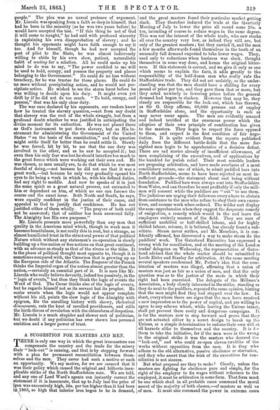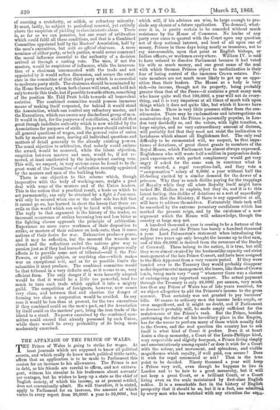I SUGGESTION FOR MASTERS AND MEN.
THERE is only one way in which the great ironmasters can compensate the country and the trade for the misery their " lock-out " is causing, and that is by stepping forward with a plan for permanent reconciliation between them- selves and the men. They never had such a motive or such an opportunity. We say motive, for we are assured that it was their policy which caused the originaland hitherto inex- plicable strike of the North Staffordshire men. We are told, and any one of Lord Ward's agents can iostantly correct the statement if it is inaccurate, that up to july last the price of icon was excessively high, 508. per ton higher than it had been ' 18634 so high that inferior iron began to be in demand,
and the great masters found their particular market getting slack. They therefore induced the trade at the Quarterly Meeting of Ally to lower the price all round some 20s. a ton, intending of course to reduce wages in the same degree. This was not the interest of the whole trade, who saw stocks all over the country very low, as indeed they still are, but only of the greatest masters ; but they carried it, and the men a few months afterwards found themselves in the teeth of an unusually full demand expected to take lower wages. They, used only to reductions when business was slack, thought themselves in some way done, and hence the original bitter- ness. If this statement is correct, and we give it only as one which seems to explain the facts, it adds greatly to the responsibility of the half-dozen men who really rule the Staffordshire trade. They did not act unfairly, as the under- standing was that the men should have a shilling for every pound of price per ton, and they gave them that or more, but they acted unwisely in lowering prices before the general demand had begun to slacken. Ho wever that may be, they clearly are responsible for the lock-out, which has thrown, as Sir G. Grey affirms, 60,000 persons out of employ in Staffordshire alone, and the opportunity is such as may never recur again. The men are evidently amazed and indeed terrified at the enormous power which the adoption of their own principle of combination has given to the masters. They begin to respect the force opposed to them, and respect is the first condition of fair nego- tiation. It is quite evident from the reports published daily from the different battle-fields that the more far- sighted men begin to be apprehensive of a decisive defeat. There are sad stories already of insufficient allowances, of men complaining of the executives, and of applications by the hundred for parish relief. Their most sensible leaders are proposing arbitration, and have made overtures of a most conciliatory nature, one of which, to admit puddled bars into North Staffordshire, seems to have been rejected on most in- sufficient grounds—the statement about cost being without foundation. Fuddled bars were always sent into Staffordshire from Wales, and can therefore be sent profitably if only the mill- men will consent while the puddlers are " out " to use them. The judicious are urging their followers everywhere to abstain from assistance to the men who refuse to obey their own execu- tives, and resume work when ordered. The wilder sort display the same apprehension when they suggest the desperate remedy of emigration, a remedy which would in the end leave the employers entirely masters of the field. They are sure of sufficient unskilled or half-skilled labour, and for highly skilled labour, science, it is believed, has already found a sub- stitute. Steam never strikes, and Mr. Menelaus, it is con- fidently affirmed, has discovered a way to make steam do the puddlers' work. The Gateshead Executive has expressed a strong wish for conciliation, and at the meeting of the London trades' delegates on Wednesday, the representative of Gates- head advised that the whole matter should be submitted to Lords Elcho and Stanley for arbitration. At the same meeting several speakers condemned Mr. Potter's idea that the com- bination of masters was illegal, affirming that a union of masters was just as fair as a union of men, and that the only question was as to the justice of the mode in which their right had been exercised. The delegate of the Afillmen's Association, a body closely interested in the strike, standing as they do next to the paddlers, repeated the same opinion, hinting that the men might find they had stepped over the law. In. short, everywhere there are signs that the men have received a new impression as to the power of capital, and are willing to agree to any scheme which, while leaving the Unions intact, shall yet prevent these costly and dangerous campaigns. It is for the masters now to step forward and prove that they are not actuated either by a secret design to break up the Unions, or a simple determination to enforce their own will at all hazards alike to themselves and the country. It is for them to take the initiative, for if the men were in the wrong in the original strike it was the masters who decreed the "lock-out," and who could re-open eleven-twelfths of the works without opposition from the men. It is they who adhere to the old alternative, passive obedience or starvation, and they who assert that the wish of the executives for con- ciliation is not sincere.
But what proposal are they to make? Clearly, unless the masters are fighting for obedience pure and simple, for the right of the employer to fix wages without reference to the employed, it must be arbitration in some form. That form, must be one which shall in all probable cases command the moral. assent of the majority of both classes,—of masters as well as of men. It must also command the power in extreme eases of coercing a crotchetty, or selfish, or refractory minority. It must, lastly, be subject to periodical renewal, yet entirely above the suspicion of yielding to class interests alone. There is, so far as we can perceive, but one court of arbitration which could fulfil all these conditions, and that is a Combined Committee appointed half by the Masters' Association, half by the men's executives, but with an official chairman. A mere nominee of either party, or both parties, would never command the moral influence essential to the authority of a decision arrived at through a casting vote. The men, if not the masters, would be suspicious of influence, while the interven- tion of a chairman unconnected with the trade and not appointed by it would soften discussion, and secure the exist- ence in the committee of that third party which is so essential to moderate party strife. The chairman should be nominated by the Home Secretary, whom both classes will trust, and hold not only towards this trade, but if possible towards others, something of the position Mr. Tidd Pratt holds towards all benevolent societies. The combined committee would possess immense means of making itself respected, for behind it would stand the Association, which can control any refractory master, and the Executives, which can coerce any disobedient group of men. It would in fact, for the purposes of conciliation, wield all that great though indefinite authority which is now wielded by the Associations for purposes of strife. Its power should extend to all general questions of wages, and the general rules of union both by masters and men, leaving all individual questions and matters of detail generally to the already existing powers. The usual objection to arbitration, that nobody could enforce the award, would be removed, while the latent objection, suspicion between masters and men, would be, if not re- moved, at least ameliorated by the independent casting vote. This will, we suspect, in very serious cases be found to be the great want of the Committee of arbitration recently appointed by the masters and men of the building trade. There is one objection to this scheme which, though inoperative with the body of working-men, weighs a good deal with some of the masters and of the Union leaders. This is the notion that a practical result, a basis on which to act permanently, can only be obtained by a fight a l'outrance, will only be secured when one or the other side has felt that it cannot go on, has learned in short the lesson that there are evils in this world which can only be faced with resignation. The reply to that argument is the history of the trades, an incessant recurrence of strikes becoming less and less bitter as the fighting classes approach the principle of arbitration. Experience no more cures workmen of their disposition to strike, or masters of their reliance on lock-outs, than it cures nations of their desire for war. Exhaustion produces peace, and it may be reflection, but the moment the wounds are closed and the reflections ended the nations give way to passion just as if they had learned nothing. All progress really effects is to provide some sort of tribunal—call it the Five Powers, or public opinion, or anything else—which makes war an exceptional evil, and as far as possible limits the calamities it must produce. The combined committee would be that tribunal in a very definite and, as it seems to us, very efficient form. The only danger if it were honestly adopted would be that it would be a little too powerful, tend too much to turn each trade which applied it into a mighty guild. The competition of foreigners, however, now comes very close, and between that and election the danger of forming too close a corporation would be avoided. In any case it would be less than at present, for the two executives if they combined could on the men's part, and the Association by itself could on the masters' part, bring the iron trade of the island to a stand. No power exercised by the combined com- mittee could exceed that already possessed by each Union, while there would be every probability of its being more moderately exercised.































 Previous page
Previous page